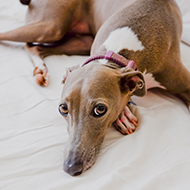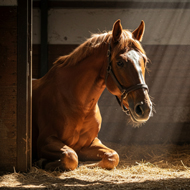Scientists report first human-to-dog transmission of monkeypox

The case was discovered in a four-year-old Italian greyhound (not pictured).
The first suspected human-to-dog transmission of monkeypox virus has been reported in Paris.
According to The Lancet, the case was discovered in a four-year-old Italian greyhound, 12 days after its owners had an onset of symptoms. The dog presented with skin lesions, pustules and thin anal ulceration.
The report said the men were co-sleeping with their dog and had been careful to prevent their dog from contact with other pets or humans from the onset of their symptoms.
Monkeypox is a viral zoonosis endemic to the west of central Africa, but cases are rising in Europe and the USA among individuals who have not travelled to endemic areas. In July 2022, the World Health Organisation declared the outbreak a 'public health emergency of international concern'.
According to The Lancet, human-to-human transmission of monkeypox virus occurs through close contact with the lesions, body fluids, and respiratory droplets of infected people or animals. However, whether domesticated dogs and cats could be a vector for the disease is not yet known.
Only wild animals have been confirmed to carry the monkeypox virus in endemic regions. However, the spread of the monkeypox virus from sick imported animals to prairie dogs in the US and captive primates in Europe has been documented. Infection among pet dogs or cats has never been reported.
In the report, scientists call for further investigation to ascertain whether pets should be isolated from people who test positive for monkeypox.
They conclude: 'To the best of our knowledge, the kinetics of symptom onset in both patients and, subsequently, in their dog suggest human-to-dog transmission of monkeypox virus. Given the dog's skin and mucosal lesions as well as the positive monkeypox virus PCR results from anal and oral swabs, we hypothesise a real canine disease, not a simple carriage of the virus by close contact with humans or airborne transmission (or both).
'Our findings should prompt debate on the need to isolate pets from monkeypox virus-positive individuals. We call for further investigation on secondary transmissions via pets.'



 Zoetis UK has called on horse owners to complete a short online survey about their horse's behaviours.
Zoetis UK has called on horse owners to complete a short online survey about their horse's behaviours.